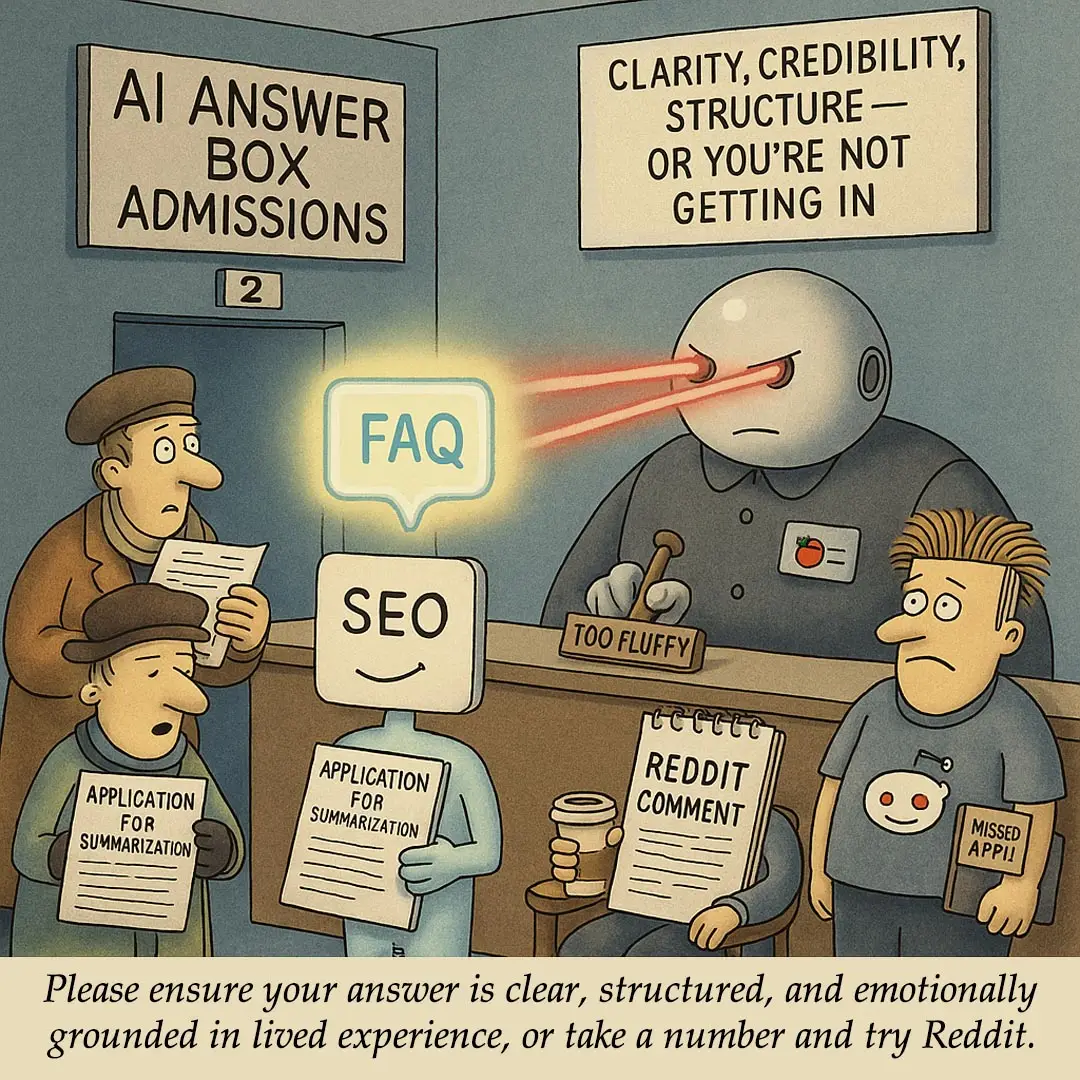Most agents still think SEO is about impressing Google.
But Google isn’t just indexing your site anymore.
Its AI is reading it, summarizing it, and deciding whether you’re worth quoting.
And that AI?
It doesn’t want your clever intro. It doesn’t care about your domain age. It doesn’t even want your keywords unless they’re helping someone solve something.
What it’s looking for is signal: fast, structured, no-fluff, human-informed signal.
And the only way to deliver it?
Generative Experience Optimization.
Yeah, it’s a mouthful. But GEO is not another acronym you can ignore like AMP or BERT.
It’s the new operating system for content that actually shows up in AI-powered search.
This is how you get included in answers instead of buried under them.
So What Is GEO, Really?
Let’s break it down like this:
SEO was about helping your page rank.
GEO is about helping the AI answer.
It’s a shift from keywords to context. From ranking signals to reasoning signals.
From “Where do I land in the list?”
To “Am I even in the answer?”
Because LLMs like Gemini, ChatGPT, Bing, and Perplexity don’t just list results.
They synthesize answers from content that meets three brutal criteria:
Clarity, credibility, and structure.
You don’t write for the algorithm anymore. You write for the AI that writes for the user.
How Does AI Choose What to Include?
Let’s talk mechanics. Because this is where most content fails.
Google’s AI Overview isn’t just summarizing random blog posts. It’s using something called retrieval-augmented generation (RAG). Think of it like this:
- It fetches relevant content across the web
- It assembles a shortlist; Reddit threads, LinkedIn posts, YouTube transcripts, blogs, news articles…
- It runs that list through its reasoning model
- Then it builds the most helpful, balanced answer it can
So what gets chosen?
- Pages with clean structure (headings, short paragraphs, clear sections)
- Content with topical authority
- Sources with reputation signals (backlinks, DR, user engagement)
- Freshness, schema markup, and real-person attribution
- And yes, increasingly, platform presence (Reddit, YouTube, LinkedIn posts (& comments) are getting cited constantly)
That’s right. Your website isn’t your only content asset anymore. If your Reddit comment is clearer than your blog post, guess which one gets quoted?
GEO = Write Like You’re Being Summarized
Most blogs are still trying to tell a story.
GEO blogs?
They’re trying to answer a question faster than the AI can on its own.
That means:
- Leading with the takeaway
- Using H2s that match actual search questions
- Writing paragraphs that don’t meander
- Breaking content into lists, tables, and bullet points (chunked content = LLM gold)
- Formatting like you’re feeding a machine… because you are
Want a real-world example?
Let’s look at LLMs Gemini, ChatGPT, Bing, and Perplexity and ask, “Is Summerlin a good place to retire?”
Most of the top citations come from:
- A real estate blog that clearly sections out cost of living, amenities, and HOA structure
- A YouTube video titled “Pros and Cons of Retiring in Summerlin”
- And from a Reddit post with actual lived experience
See those examples here: Gemini, ChatGPT, Bing, and Perplexity.
Those red arrows in the screenshots? They are pointing to one of our best content creating clients, Angela O’Hare from Summerlin, NV.
It’s not always the biggest site that wins.
It’s the clearest one.
The Role of Experience (Finally) Matters
Here’s where GEO gives underdogs a real edge.
AI is learning to value E-E-A-T… especially the “Experience” part.
It doesn’t just want facts. It wants someone who’s lived them.
That means your closing story about the couple you helped navigate a surprise zoning issue?
That’s not filler. That’s fuel.
GEO means structuring that experience in a way that the AI can recognize and lift.
Make it clear. Make it scannable. Make it something a bot would quote in a conversation.
Are You GEO-Ready Yet?
Here’s a quick sniff test.
- Does your article answer a real question in the first 2 lines?
- Does it read well out loud to a skeptical client?
- Can you skim the H2s and get the gist?
- Would it hold up if pulled into a ChatGPT summary, with no context?
- Did you cite anything real like a quote, stat, source, or story?
If not?
You’re probably invisible to the AI.
This Isn’t Optional Anymore
GEO isn’t a trend. It’s the new cost of entry.
Content that isn’t designed to be summarized won’t just fail to rank.
It won’t even get seen.
But if you get this right?
You don’t need to publish 50 blogs on the same topic. You need five good ones.
Clear. Structured. Citable.
That’s how you start showing up in answers.
And that’s how people start showing up in your inbox.
Want to know what makes your content quotable? Try this:
Paste it into ChatGPT and ask for a summary.
If what comes back feels generic or jumbled, the bots will probably ignore you too.
Need help turning it into something they’ll actually use?
That’s where ReadTomato comes in.
TLDR: Traditional SEO focused on rankings. Generative Experience Optimization (GEO) is about earning inclusion in AI-generated answers. Google’s AI Overview and other LLM-based tools select content based on clarity, structure, and topical authority, not just keywords or backlinks. To win visibility now, your content must be scannable, citable, and useful enough to be summarized by AI. Don’t just try to rank. Write like you’re being quoted.



Miami Luxury Real Estate Marketing That Wins Cash Buyers
Miami is not cooling the way broad headlines suggest. $5M+ homes still trade, often with cash, and buyers move fast. If you want the local context in a “numbers first” tone, our post on Miami real estate marketing with Heat math shows how attention spikes still convert when your message stays precise. Here’s the uncomfortable […]